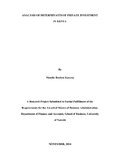| dc.description.abstract | While applying a time series model borrowed from Blejer and Khan (1984) as a suitable
investment model for developing countries, this paper explores different factors that affect
domestic private investment in Kenya. The data of the investment factors have mainly been
sought from Kenya Economic Survey among other national statistic sources. Statistical
procedures relating principally to time series analysis are used with the help of STATA
computer program including the different diagnostic tests to yield the findings of the study.
According to the results obtained, income growth has been significantly supportive to the
growth of domestic private investment in Kenya. On the other hand, lagged private
investment was also found to have the same kind of significant and positive effects. The
effects of public investment on private investment were found to be unfavourable but
insignificant, so did those of Credit to the Private Sector. Credit to the private sector as a
variable portrayed an inconsistency to the expectations that it should be much influential in
the growth of investment in developing countries. This is so because credit controls are
prevalent in theory and practice as tools of economic policy. The finding, however, is not as
strange in relation to those of many studies in this subject area.
The results of this study imply that economic players in Kenya should be committed to the
production process, enhancing it intensively if they are to better domestic private investment.
This means that production and investment atmosphere need to be pleasant to economic
agents. On how to use the tools of credit control and fiscal control through government
expenditure, the results have not been sufficiently determinate. The results on the whole
nevertheless give an insight into the working of domestic private investment in Kenya.
Imperatively, however, more studies and theoretical considerations modifying the variables
should be sought to foster better understanding of the investment function in Kenya and the
whole world. | en_US |

